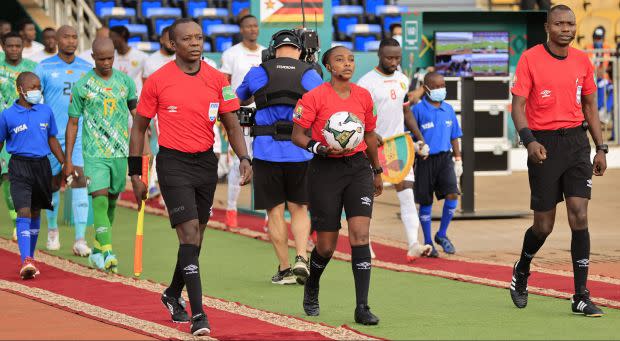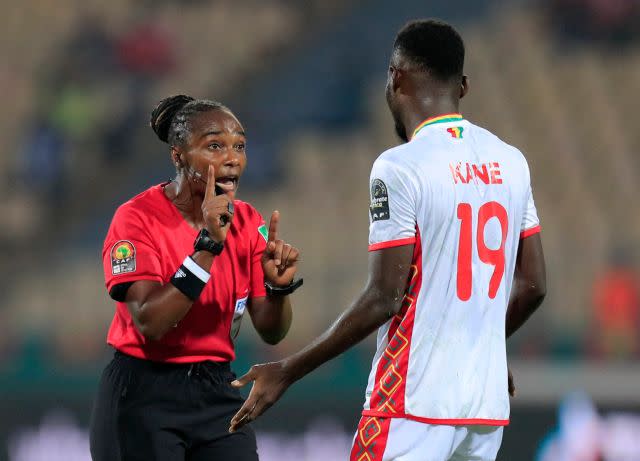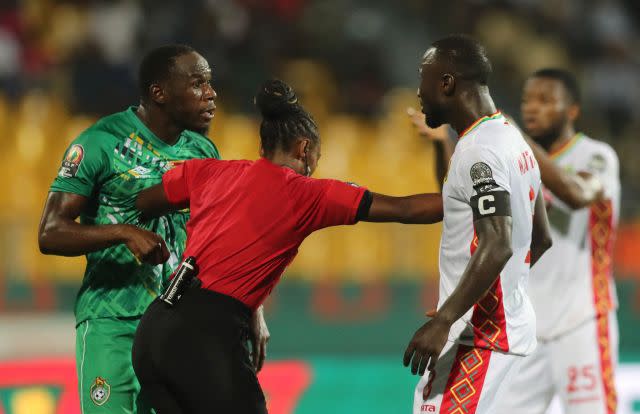A Rwandan is the first woman to officiate an Africa Cup of Nations match
- Oops!Something went wrong.Please try again later.

A female Rwandan referee has made history at the ongoing Africa Cup of Nations (Afcon) in Cameroon by becoming the first woman to officiate a match in the tournament’s 65-year history.
Salima Mukansanga was the fourth official—an assistant who helps the referee by supervising substitution procedures and performing other administrative duties—for the group stage match between Guinea and Malawi on Jan. 10. And later, on Jan. 18, she refereed the group stage match between Zimbabwe and Guinea.
“It’s a privilege. It’s a pleasure to me, to the rest of African women referees,” Mukansanga said at a press conference on Jan. 21 by the Confederation of African Football (CAF), the tournament’s organizer. “It’s [an] opportunity to open the door and to show that all African [women] are capable. They can reach that stage.”
Soccer refereeing is a male-dominated profession
Mukansanga has also officiated at the Olympics, Women’s World Cup, Africa Women Cup of Nations, and the CAF Women’s Champions League.
Her latest achievement, in Africa’s most prestigious soccer competition, is a milestone in the development of female refereeing in soccer in the continent and for the sport globally. The role has historically been a male-dominated profession. Sexism from players and spectators, lack of female recruitment for the profession by soccer bodies, and negative stereotypes by spectators are some of the obstacles women face in refereeing (pdf) in soccer and other sports as they create a hostile environment for the profession.
“We’re here not because we had favor to be here,” Mukansanga said . “[It’s] because we deserve to be here.”
“So, back home, we have been working very hard, because a lot [of people] say, ‘Women, they can’t run at the pace of men, the speed and whatever,'” she adds. “Yes, we can’t be men, but we can do our best to be on the same level.”

Salima Mukansanga speaks to Guinea’s Mamadou Kane.
But soccer bodies have started to become more inclusive, with more women globally getting jobs as referees at top levels of the sport. In a recent example, France’s Stephanie Frappart and Ukraine’s Kateryna Monzul last year became the first women to referee FIFA World Cup qualifiers.
There’s also a notable contrast to the men’s game in officiating matches in the Women’s World Cup, where FIFA, the soccer’s global governing body, has required only female referees for the competition since 1995.
The number of female referees is increasing as well, going up by 76% from 2016 to 2020 in English football, for instance.

Salima Mukansanga reacts as players clash in the 2022 Afcon match between Zimbabwe and Guinea.
Four women were selected as match officials for Afcon
Mukansanga is one of four women selected by CAF as match officials for this year’s tournament. The others are assistant referees Carine Atemzabong of Cameroon and Fatiha Jermoumi of Morocco, and video assistant referee Bouchra Karboubi of Morocco.
“We are super proud of Salima [Mukansanga] because she has had to work exceptionally hard to be where she is today. We know that for a woman, she has had to overcome serious obstacles to reach this level and she deserves a lot of credit,” said Eddy Maillet, CAF’s head of referees, in an announcement about Mukansanga’s achievement.
“This moment is not just for Salima but for every young girl in Africa who has passion for football and who sees herself as a referee in the future. “
Sign up to the Quartz Africa Weekly Brief here for news and analysis on African business, tech, and innovation in your inbox.
Sign up for the Quartz Daily Brief, our free daily newsletter with the world’s most important and interesting news.
More stories from Quartz:

